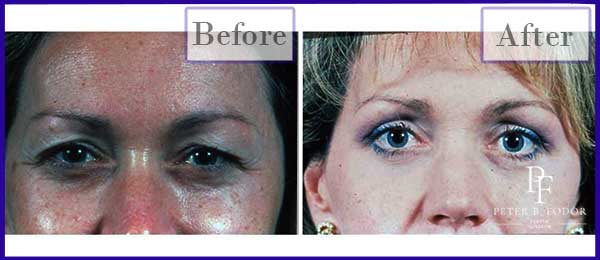Eyelid Surgery Los Angeles | Las Vegas
About Eyelid Surgery by Los Angeles Plastic Surgeon in Beverly Hills
The eyes are the central focus of facial expression. Eye contact is a primary way people gauge each other’s emotions; whether it’s looking or love or trying to detect if someone is being truthful, the eyes tell all. Beautiful eyes light up a face. Eyelid surgery, technically called blepharoplasty, can remove excess eyelid skin, correct bagginess, and puffiness, and with related procedures, alter eyelid position, to restore or create a brighter, more rested, and alert appearance. Although most candidates for eyelid surgery are over the age of 35, younger patients with droopy or baggy eyelids that are inherited traits can also benefit from this procedure.
In aesthetically ideal eyes, no white is seen above or below the iris, the colored ring around the pupil. The upper lid rests just below the top of the iris and the lower lid rests just above the bottom border of the iris.
If the upper lid is too droopy, covering a disproportionate amount of the iris, it can create a tired look and make the eyes appear smaller. A weakness or detachment of the muscle that holds the eyelid open, due to aging or heredity, is the main cause of droopy eyelids (eyelid ptosis).
Eyelid laxity can cause the lower lids to droop, allowing the white of the eye to be seen between the lower lid and the iris. This can create a tired, aged appearance. Even less sever eyelid laxity, where the lower lid droops but still covers part of the iris, can cause dry eye symptoms. If laxity exists to any degree, is should be corrected.
Upper and lower eyelid surgery can correct baggy eyelids caused by excess skin. In addition, eyelid surgery can remove or reposition herniated fat of the lower eyelids, which can result from aging or genetics and cause bulging and eyelid puffiness. Dark circles under the eyes can result from shadows case by fat bulges in the lower lids. In these cases, altering the fat, either by removing it or repositioning it, will often improve the appearance. In some cases, edema (fluid collection) may be the cause of puffiness, or dark circles may be simple skin discoloration. In the latter case, chemical peels or laser resurfacing may help somewhat.
In deciding on the best approach to your blepharoplasty procedure, many factors including the skeletal structure around your eyes are important to consider. In some patients, removing fat from the lower eyelids can create a hollowed-out appearance, and the appearance of dark circles might worsen. In such cases, alternative approaches to rejuvenating the eyelid areas, such as repositioning fat rather than removing it, can be used.

Eyelid Surgery Los Angeles | Las Vegas
Length of Surgery: Usually 30-90 minutes
Anesthesia: Typically local anesthetic with intravenous sedation or general anesthesia. On the cutting edge and preferred by Dr. Fodor is TIVA, which is a combination of the two. It diminishes bleeding and post-operative nausea. Dr. Fodor has used this method for many years.
Recovery: Initial mild discomfort typical; minimal activity for a few days; back to work in 7- 10 days; eye makeup in one to two weeks; wear contacts in one to two weeks.
Scars: virtually undetectable

View Dr. Fodor’s before and after photo gallery of upper and lower blepharoplasty for men and women.
Benefits of Eyelid Surgery
Eyelid surgery can provide several benefits, including:
- Younger-looking appearance
- Reduced puffiness and wrinkles around the eyes
- Improved vision
- Increased self-confidence
Your Favorite Version of You Begins Here
Call today to schedule your confidential consultation with Dr. Peter Fodor to discuss your cosmetic goals.
